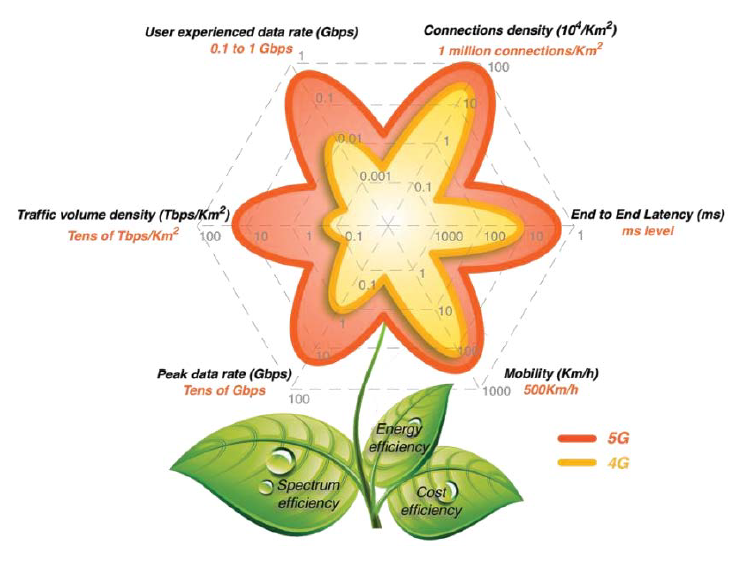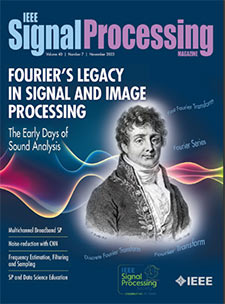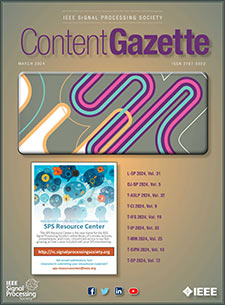- Our Story
- Publications & Resources
- Publications & Resources
- Publications
- IEEE Signal Processing Magazine
- IEEE Journal of Selected Topics in Signal Processing
- IEEE Signal Processing Letters
- IEEE/ACM Transactions on Audio Speech and Language Processing
- IEEE Transactions on Computational Imaging
- IEEE Transactions on Image Processing
- IEEE Transactions on Information Forensics and Security
- IEEE Transactions on Multimedia
- IEEE Transactions on Signal and Information Processing over Networks
- IEEE Transactions on Signal Processing
- IEEE TCI
- IEEE TSIPN
- Data & Challenges
- Submit Manuscript
- Guidelines
- Information for Authors
- Special Issue Deadlines
- Overview Articles
- Top Accessed Articles
- SPS Newsletter
- SigPort
- SPS Resource Center
- Publications Feedback
- Publications FAQ
- Blog
- News
- Dataset Papers
- Conferences & Events
- Community & Involvement
- Professional Development
- For Volunteers
- Information for Authors-OJSP
-
Home
Conferences Events IEEE JSTSP Article IEEE Signal Processing Magazine IEEE TIFS Article IEEE TMM Article IEEE TSP Article Jobs in Signal Processing Lectures Machine Learning Seasonal Schools Signal Processing News SPM Article SPS Distinguished Lectures SPS Newsletter Article SPS Webinar SPS Webinars SPS Webinar Series Webinar webinars
-
Our Story
What is Signal Processing?

The technology we use, and even rely on, in our everyday lives –computers, radios, video, cell phones – is enabled by signal processing. Learn More » -
Publications & Resources
-
SPS Resources
- Signal Processing Magazine The premier publication of the society.
- SPS Newsletter Monthly updates in Signal Processing
- SPS Resource Center Online library of tutorials, lectures, and presentations.
- SigPort Online repository for reports, papers, and more.
- SPS Feed The latest news, events, and more from the world of Signal Processing.
-
SPS Resources
-
Conferences & Events
-
Community & Involvement
-
Membership
- Join SPS The IEEE Signal Processing Magazine, Conference, Discounts, Awards, Collaborations, and more!
- Chapter Locator Find your local chapter and connect with fellow industry professionals, academics and students
- Women in Signal Processing Networking and engagement opportunities for women across signal processing disciplines
- Students Scholarships, conference discounts, travel grants, SP Cup, VIP Cup, 5-MICC
- Young Professionals Career development opportunities, networking
- Get Involved
-
Technical Committees
- Applied Signal Processing Systems
- Audio and Acoustic Signal Processing
- Bio Imaging and Signal Processing
- Computational Imaging
- Image Video and Multidimensional Signal Processing
- Information Forensics and Security
- Machine Learning for Signal Processing
- Multimedia Signal Processing
- Sensor Array and Multichannel
- Signal Processing for Communication and Networking
- Signal Processing Theory and Methods
- Speech and Language Processing
- Technical Working Groups
- More TC Resources
-
Membership
-
Professional Development
-
Professional Development
- Mentoring Experiences for Underrepresented Young Researchers (ME-UYR)
- Micro Mentoring Experience Program (MiME)
- Distinguished Lecturer Program
- Distinguished Lecturers
- Distinguished Lecturer Nominations
- Past Lecturers
- Distinguished Industry Speaker Program
- Distinguished Industry Speakers
- Distinguished Industry Speaker Nominations
- Industry Resources
- IEEE Training Materials
- Jobs in Signal Processing: IEEE Job Site
-
Career Resources
- SPS Education Program Educational content in signal processing and related fields.
- Distinguished Lecturer Program Chapters have access to educators and authors in the fields of Signal Processing
- PROGRESS Initiative Promoting diversity in the field of signal processing.
- Job Opportunities Signal Processing and Technical Committee specific job opportunities
- Job Submission Form Employers may submit opportunities in the area of Signal Processing.
-
Professional Development
-
For Volunteers
-
For Board & Committee Members
- Board Agenda/Minutes* Agendas, minutes and supporting documentation for Board and Committee Members
- SPS Directory* Directory of volunteers, society and division directory for Board and Committee Members.
- Membership Development Reports* Insight into the Society’s month-over-month and year-over-year growths and declines for Board and Committee Members
-
For Board & Committee Members
Popular Pages
Today's:
- Submit a Manuscript
- Information for Authors
- Signal Processing Cup
- (ICASSP 2024) 2024 IEEE International Conference on Acoustics, Speech and Signal Processing
- (ICASSP 2025) 2025 IEEE International Conference on Acoustics, Speech and Signal Processing
- (SLT 2024) 2024 IEEE Spoken Language Technology Workshop
- (MLSP 2024) 2024 IEEE International Workshop on Machine Learning for Signal Processing
- IEEE Transactions on Multimedia
- Signal Processing 101
- IEEE/ACM Transactions on Audio Speech and Language Processing
- IEEE Transactions on Image Processing
- IEEE Signal Processing Letters
- SPS Scholarship Program
- IEEE Transactions on Information Forensics and Security
- Award Recipients
All time:
- Information for Authors
- Submit a Manuscript
- IEEE Transactions on Image Processing
- 404 Page
- IEEE/ACM Transactions on Audio Speech and Language Processing
- IEEE Transactions on Information Forensics and Security
- IEEE Transactions on Multimedia
- IEEE Signal Processing Letters
- IEEE Transactions on Signal Processing
- Conferences & Events
- IEEE Journal of Selected Topics in Signal Processing
- Information for Authors-SPL
- Conference Call for Papers
- Signal Processing 101
- IEEE Signal Processing Magazine
Last viewed:
- Call for Proposals: IEEE ASRU 2025
- Conferences
- (ICME 2024) 2024 IEEE International Conference on Multimedia and Expo
- Information for Authors
- Editorial Board
- IEEE Transactions on Signal Processing
- Multi-sequence Cardiac MR Segmentation Challenge (MS-CMRSeg 2019)
- IEEE/ACM Transactions on Audio Speech and Language Processing
- (ICIP 2026) 2026 IEEE International Conference on Image Processing
- SPS Education
- (ICASSP 2025) 2025 IEEE International Conference on Acoustics, Speech and Signal Processing
- About IEEE Transactions on Signal Processing
- Jobs in Signal Processing
- SPS Scholarship Program
- Submit a Manuscript
A Survey on MIMO Transmission With Finite Input Signals: Technical Challenges, Advances, and Future Trends
You are here
Newsletter Menu
Newsletter Categories
Top Reasons to Join SPS Today!
1. IEEE Signal Processing Magazine
2. Signal Processing Digital Library*
3. Inside Signal Processing Newsletter
4. SPS Resource Center
5. Career advancement & recognition
6. Discounts on conferences and publications
7. Professional networking
8. Communities for students, young professionals, and women
9. Volunteer opportunities
10. Coming soon! PDH/CEU credits
Click here to learn more.
News and Resources for Members of the IEEE Signal Processing Society
A Survey on MIMO Transmission With Finite Input Signals: Technical Challenges, Advances, and Future Trends

The explosive growth in the use of smart mobile devices such as smartphones and wireless modems has led to an exponentially increasing demand for wireless data services. This demand has led to substantial efforts for improving the spectral efficiency and data throughput of wireless communication systems. In particular, multiple-input–multiple-output (MIMO) technologies are particularly promising in providing gains in multiplexing and/or diversity. It is a proven fact that by increasing the number of antennas at base stations and mobile terminals, communication systems can achieve better performance in terms of both system capacity and link reliability. MIMO technology has thus been adopted by a number of prominent wireless communication standards across the world. Most advances in the design of high-speed wireless MIMO systems have however been based on information-theoretic principles that demonstrate how to efficiently transmit signals conforming to Gaussian distribution. Although the Gaussian signal is capacity achieving, practical systems transmit signals belonging to finite and discrete constellations. Therefore, capacity-achieving transceiver processing based on a Gaussian input signal can be quite suboptimal for practical MIMO systems with discrete constellation input signals. To address this shortcoming, this paper aims to provide a comprehensive overview of MIMO transmission design with finite input signals.
The paper published in PROCEEDINGS OF THE IEEE in Oct. 2018 first summarizes the existing fundamental results for MIMO systems with finite input signals. Next, focusing on basic point-to-point MIMO systems, it examines transmission schemes based on the three most important criteria for communication systems: mutual-information-driven designs, mean-square-error-driven designs, and diversity-driven designs. In particular, a unified framework is developed for the design of lowcomplexity transmission schemes applicable to massive MIMO systems in forthcoming fifthgeneration (5G) wireless networks for the first time. Adaptive transmission designs that switch among these criteria based on channel conditions to formulate the best transmission strategy are also proposed. The paper includes an overview of transmission designs with finite input signals for multiuser MIMO scenarios, including MIMO uplink transmission, MIMO downlink transmission, MIMO interference channel, and MIMO wiretap channel. Additionally, transmission designs with finite input signals are discussed for other multiantenna systems. The paper concludes with a discussion of a number of unsolved technical challenges and future trends in transmission design with finite input signals.
Open Calls
Society News
- A Special Upcoming Webinar from Dr. Lajos Hanzo: November 19, 2018
- 267 Signal Processing Society Members Elevated to Senior Member!
- Job Opportunities in Signal Processing
- New SPS Technical Interest Profile Codes
- Upcoming SPS Webinar! 4 October 2018: 40 Years of Tracking for Radar Systems: A Cross-Disciplinary Academic and Industrial Viewpoint
- The IEEE Signal Processing Society Launches Author Survey
- Renaming of Society Level Awards
Education & Resources
Publications News
Conference News
Chapter & DL News
Initiatives & Trends
SPS on Twitter
- DEADLINE EXTENDED: The 2023 IEEE International Workshop on Machine Learning for Signal Processing is now accepting… https://t.co/NLH2u19a3y
- ONE MONTH OUT! We are celebrating the inaugural SPS Day on 2 June, honoring the date the Society was established in… https://t.co/V6Z3wKGK1O
- The new SPS Scholarship Program welcomes applications from students interested in pursuing signal processing educat… https://t.co/0aYPMDSWDj
- CALL FOR PAPERS: The IEEE Journal of Selected Topics in Signal Processing is now seeking submissions for a Special… https://t.co/NPCGrSjQbh
- Test your knowledge of signal processing history with our April trivia! Our 75th anniversary celebration continues:… https://t.co/4xal7voFER
Home | Sitemap | Contact | Accessibility | Nondiscrimination Policy | IEEE Ethics Reporting | IEEE Privacy Policy | Terms | Feedback
© Copyright 2024 IEEE – All rights reserved. Use of this website signifies your agreement to the IEEE Terms and Conditions.
A not-for-profit organization, IEEE is the world's largest technical professional organization dedicated to advancing technology for the benefit of humanity.









